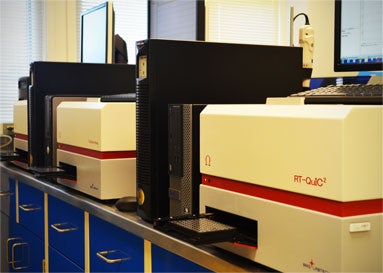- Diagnostic testing of CSF for surrogate disease markers (i.e., 14-3-3 and total tau) assumes that the patient had a history of acute dementia but did not have several conditions that might compromise the test results. These conditions include, but are not limited to, subarachnoid hemorrhage, various encephalitis, stroke with acute infarction, multi-infarct dementia with acute infarction, brain neoplasm and paraneoplastic neurological disorders. All of these conditions may yield false-positive results. Across all prion diseases, CSF RT-QuIC has a diagnostic sensitivity and specificity of 90.3% and 98.5%, respectively (Rhoads DD, Neurology 2020).
- The cerebrospinal fluid (CSF) should be obtained by lumbar puncture. The first 2ml of CSF that flows from the tap should be discarded. Collect 2-5ml of CSF, avoiding bloody tap.
- The CSF should be frozen as quickly as possible (preferably within 20 minutes) and stored at -80°C freezer (or, lacking that, in a -20°C freezer) until shipment on dry ice.
- It is very important that you inform us of any follow-up information you may obtain, such as familial history of dementia and rapid deterioration of the patient's condition. If CSF or brain materials are collected in the future, a portion should be frozen immediately and sent to us for further diagnosis.
CSF Shipment
- A recent re-evaluation of the shipment conditions of CSF specimens showed that shipment at room temperature caused an average loss of ~50% for the 14-3-3 protein (range ~32 to ~91%) and ~9% for tau, when compared with shipment of frozen CSF samples on dry ice.
It is essential to ship CSF specimens frozen with dry-ice in order to obtain reliable results.
Policy Changes Effective May 1st, 2011
- The National Prion Disease Pathology Surveillance Center (NPDPSC) will be charging for testing on cerebrospinal fluid (CSF) effective May 1st, 2011.
- In addition to our Test Request Form, all senders of CSF will be required to also complete and submit our Billing Requisition Form ONLY if the NPDPSC is to bill patient directly.
- For Roster/Client Billing, send out labs only need to submit our Test Request Form if NPDPSC is to bill lab directly.
- For questions regarding these policy changes, please contact us at 216-368-0587. For billing questions, please contact our billing department at 877.854.3904.
Policy Changes Effective April 20, 2015
From April 20, 2015 onwards, NPDPSC will test for prions in cerebrospinal fluid (CSF) using the second generation RT QuIC test. This version of the test [Orrú CD, et al., MBio. 2015 Jan 20;6(1)] has been validated on a large number of autopsy-verified cases of CJD and other neurodegenerative diseases. Also, the NPDPSC transferred on-site production of an essential reagent. The autopsy–verified data indicate 98.5% specificity and 89-92% sensitivity for detection of all human prion diseases. In parallel, we will continue CSF testing for 14-3-3 and tau protein markers. Extensive validation of these two later tests for the clinical diagnosis of prion disease showed 83-90% sensitivity and 78% diagnostic accuracy [Hamlin, C. et al., Neurology 2012, Aug 7;79(6):547-52] and they are complementary to RT QuIC. Reporting of results will occur with a turnaround time of approximately 7 days.


